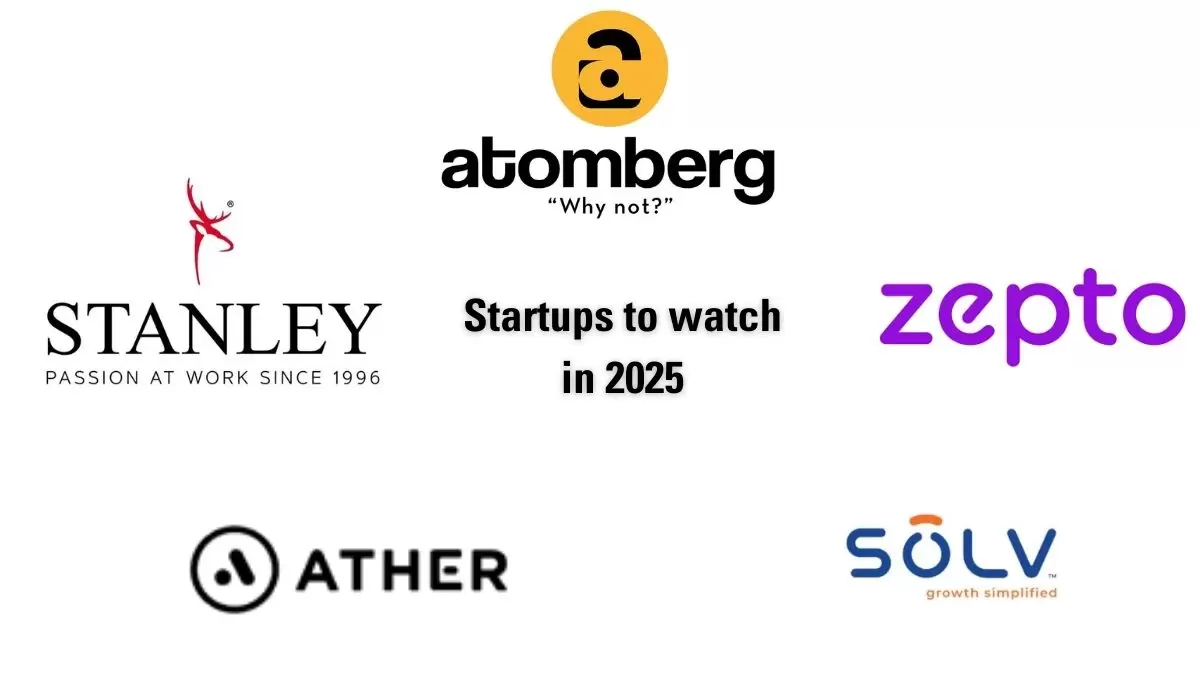New Delhi: The Underdog’s unexpected win over the Bully will always remain a fascination that everyone relates to. Whether it is the unknown Xiaomi who rose to become the world’s largest affordable smartphone maker within a decade to the unassuming rags-to-riches stories of founders who overcame every challenge, the success (and failure) of a startup is a fascination we can never get over with.
With every technological disruption offering a chance to alter the market share in a tightly-contested market, the performance of a startup is closely watched as they have the potential to dominate the market and eventually force the existing players to adapt to changing customer demands.
With new ideas, innovations and technologies determining the fate of any business, India’s burgeoning startup space is seeing a lot of interest from investors and industry analysts the world over. Here, we have compiled a list of startups who show the most promise in 2025.
B2C
Atomberg- Atomberg’s IIT-educated co-founders ventured into a product category no one took seriously and changed it forever. For decades, your ceiling fans have come with an induction motor- an outdated technology that was cheap but energy-guzzling. Atomberg came up with a lighter, BLDC electric motor that reduced energy consumption by more than 60%, while giving a long-lasting solution complete with a smart remote and better usage efficiencies. Solving such ‘invisible’ issues has seen its revenue soar in triple digits, prompting them to expand their manufacturing facilities. Though not yet profitable, Atomberg’s massive rise from obscurity is going to be keenly watched.
Zepto- 5 years ago, the pandemic bought with it unexpected business opportunities. One that has remained successful is Zepto, the quick commerce app that’s giving traditional e-commerce a run for its money. Helmed by 2 Stanford university graduates, Zepto got the first-mover advantage in the 10 minute delivery space and has expanded aggressively across the country ever since. Now that it’s become a billion dollar unicorn, the company will need to balance aggressive growth with financial viability, as it still needs to reduce its losses even as its revenue soars.
Ather- The lesser-known rival to Ola’s e-scooters, Ather was the first company to pioneer e-bikes in India. Although Ola’s massive rise has overshadowed Ather’s advanced product range, the earlier controversies about EVs catching fire spontaneously have not affected Ather. Ather’s bikes are loaded with glitzy SUV-like specs, unlike its competitors who aim to offer better value for money and charging range. With more than 10% market share and an IPO coming soon this year, everyone’s watching how Ather can carve its niche in the hyper-competitive EV space.
Lea Clothing Co- There are very slim differentiating factors for the high stakes, high volume, high costs and high returns fashion market. Trends can become viral overnight, and go out of fashion even quicker. In such a situation, Lea Clothing Company, a brand offering customized corsets for curvy Indian women, secured a combined deal with 4 sharks, quite rare for a fashion brand. Though it has a limited market of educated urban women looking for Western-style corsets, it has shown a great promise considering its high retention rate and customer preferences over other established brands. This is one niche brand that’s surely going to remain in the spotlight, especially after their Shark Tank appearance.
B2B
Biofuelcircle- This startup aims to bring together biofuel suppliers and industrial customers on a single platform. Biofuelcircle helps industrial clients get their regular supply of ethanol or other biofuels from rural plants that produce them. It has given farmers a new source of income to collect, process and sell their agricultural waste for every crop cycle without setting fire on them or dumping them somewhere.
This Pune-based company has raised about 75 crore to date and many are looking at this company with great promise as it solves a problem that no one cared about initially. Its promise of reducing inefficiencies and boosting incomes for rural communities have boosted expectations for this Zomato-like aggregator that has greater potential for growth with lesser competition.
Bizongo- As a B2B aggregator, Bizongo aims to solve procurement, financing and logistics through a single platform. This startup started showing promise during the pandemic, when arranging for manufacturing essentials became challenging. Though the startup has helped businesses reduce cost and time, its still struggling to get orders, spending 2x the value of its revenue to gain business. Though the business model is showing promise, the question on everyone’s mind is how and when the company will become profitable, even as leading venture capitalists pour in their money.
Stanley Lifestyles– This brand created a name for itself in the luxury furniture industry-when no one cared. Though its quite an old brand, it has understood the changing customer preferences, tastes and requirements to become India’s most well known luxury-furniture brand. With revenues reaching upwards of 400 crores in 2023 and an operating revenue increasing by more than 40% annually, everyone is waiting with bated breath for its IPO slated for later this year. Even though Indians are still not over their fascination for IKEA and foreign branded furniture, Stanley Lifestyles has managed to capture about half of the luxury furniture market. It would be interesting to see how other brands like Pepperfry and Urban Ladder react to this!
Solv– Similar to Bizongo, Solv aims to help SMEs find a market for their wares without dealing with middlemen.It also solves many other order filfillment challenges like access to credit, shipping and payment options. Currently, this Bengaluru-headquartered startup has has more than 2,000 sellers and 2 lakh buyers registered on their platform. It aims to address inefficiencies just like Ola and Oyo did for their respective industries. How it manages to compete with Indiamart and JustDial remains to be seen. Currently backed by SBI and Standard Chartered, Solv aims to go public by 2026.





